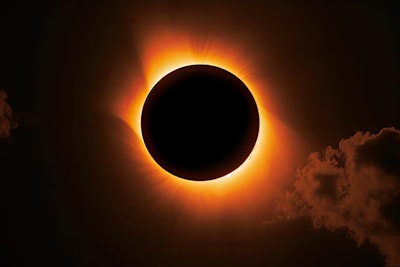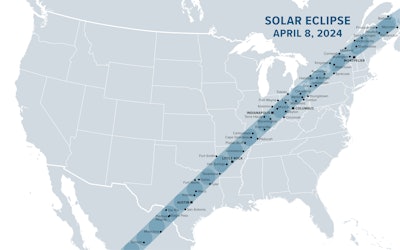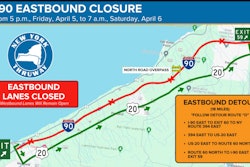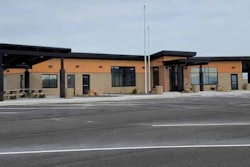

- Don't look directly at the sun without properly protective glasses, but don't wear them while driving.
- Turn your lights on just as you would at night.
- Expect heavier than normal traffic along the eclipse path; much heavier if you believe the forecasts most state departments of transportation are making.
The path of totality -- total darkness caused by the Moon passing in front of the Sun -- will begin in the U.S. in Texas and then pass over Oklahoma, Arkansas, Missouri, Illinois, Kentucky, Indiana, Ohio, Pennsylvania, New York, Vermont, New Hampshire and Maine. The eclipse event begins in the U.S. with partial darkness shortly after noon in Laredo, Texas, and concludes at about 4:40 p.m. in Presque Isle, Maine. This map shows when the eclipse begins in select locations across the country and when it ends.
Ahead of Monday's eclipse, many of those states in its patch have been forecasting major increases in the amount of traffic on their highways. Most have been urging visitors to "Come early. Stay put. Leave late."
State departments of transportation, some governor's offices and even tourism departments have been warning eclipse visitors to treat the event the same as they would a major storm. Some are urging motorists to carry emergency supplies like food, water, and blankets. They also suggest making sure your vehicle has a full tank of gas.
Indiana
Due to the solar eclipse and the anticipated traffic increase, on Monday, April 8 the Indiana State Police - Commercial Vehicle Enforcement Division is going to limit the operations at the eight weigh stations.
By noon on Monday, all weigh stations will cease normal operations and will serve as a safe haven for commercial vehicles should drivers choose to find a safe location to park, rather than continue driving during the eclipse.
The weigh stations will be available only for commercial vehicle parking. Parking will be available until all spots are filled.
Texas
The Texas Department of Motor Vehicles recently announced there will be no oversize loads allowed to travel from midnight Sunday to midnight on Monday, the day of the solar eclipse.
The ban on oversize loads includes more than 80 counties along a 480-mile stretch through the state. Some vehicles potentially affected by this ban include truck-tractor combinations and vehicles hauling wide loads in excess of 8 feet 6 inches.
New York
New York is giving fuel haulers a break from hours of service regulations because of the eclipse.
Effective from Sunday, April 6 until Wednesday, April 10, the State of New York Department of Transportation has instituted hours of service exemptions for fuel haulers due to travel impacts caused by a solar eclipse. Due to the possibility of petroleum delivery impediments from the eclipse, NYDOT is temporarily modifying 17 NYCRR 820.6 as follows:
- The 70-hour maximum on duty period in 8 days is modified to be 84 hours
- The 60-hour maximum on duty period in 7 days is modified to be 74 hours
- The 14-hour maximum workday is modified to be 16 hours. An 8 hour off duty period must be taken to reset the 16-hour provision
- The 34-hour restart provision is modified to be 24 hours. Carriers may utilize a 24-hour off-duty period that occurred prior to April 2
- On-duty time for the purposes of computation of the 60/70 or 14-hour rules shall not include time spent waiting in a commercial motor vehicle while on the property of a shipper or carriers, loading point, unloading point, or terminal immediately subsequent to or preceding loading/unloading operations.
The driver does not need to carry a copy of the declaration when exercising this temporary relief. This declaration does not apply to the Interstate Highway System.
Arkansas
The state's eclipse traffic management plan released in February suggested truckers take the day off to avoid having fright become trapped in highway congestion. The state is expecting some 4 million visitors.
Vermont
The northern half of the state will fall within the path of totality during the solar eclipse on April 8. Vermont is expecting a large influx of visitors to the state. Traffic is expected to be heavier on the day of the eclipse and the days surrounding the eclipse.
In preparation for this, the Vermont Department of Motor Vehicles is "strongly urging commercial motor vehicle drivers traveling to and through Vermont on those dates to consider alternative delivery dates and routes whenever possible to avoid the expected increase in traffic."
Additionally, to assist in easing with the flow of traffic on the day of the eclipse, the Vermont Department of Motor Vehicles is instituting the Saturday, Sunday, and holiday restrictions for over-dimension/overweight commercial motor vehicles effective for Monday, April 8.
The restrictions are:
On state highways, unless otherwise stated, permits will not be issued for the movement of loads in excess of 108,000 pounds or more than 12 feet wide or more than 100 feet long.












